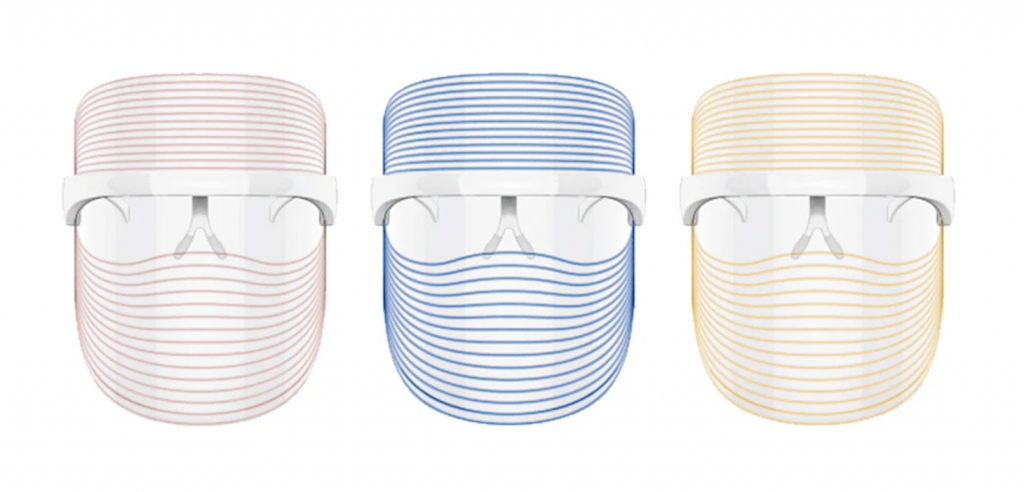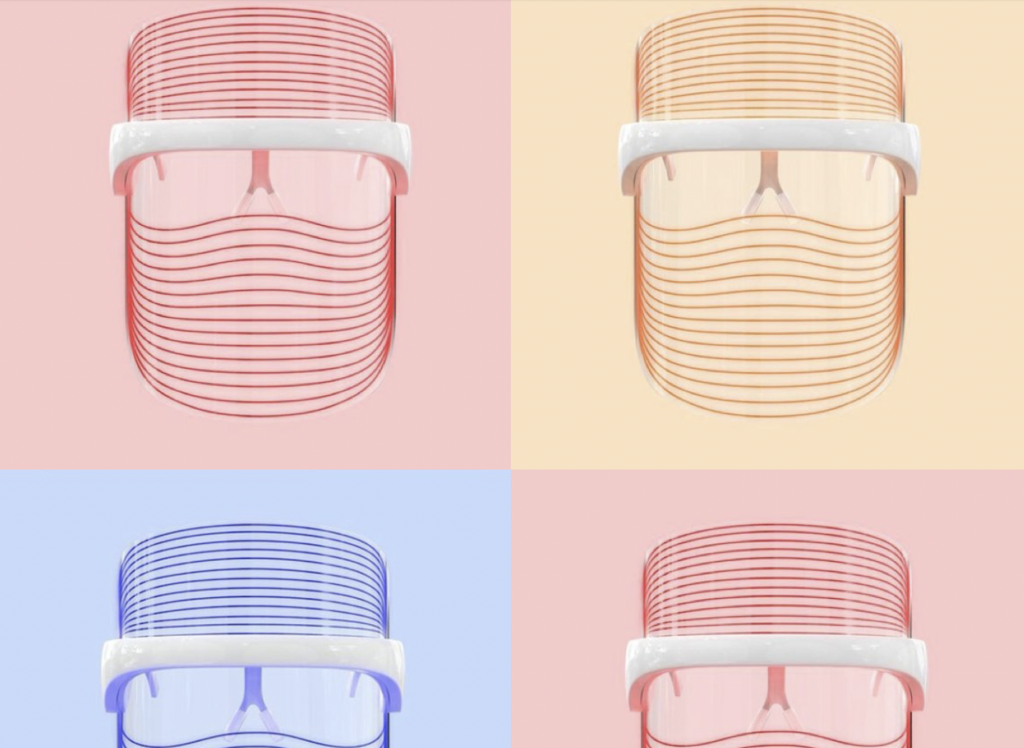DMH Aesthetics is not only taking on rival Goodskin Clinic in a trademark case over an LED light-lined face shield, the medical clinic is also targeting a handful of others in a newly-filed suit. In the complaint that it filed in a California federal court on Wednesday, DMH claims that Vanity Mask, Lux Light Therapy, Luma Aesthetics, Social Skin Co., and Trygloo, among others, are infringing its copyright and trademark rights in the design of an LED mask and packaging, which DMH says that it has been “advertising, displaying, and selling” since February 2019.
In its newly-filed complaint, Los Angeles-based DMH Aesthetics asserts that it maintains rights in “unique two-dimensional non-functional artworks,” which it “exploits for profit by selling products bearing the designs or entering into licensing agreements for sale or display by third parties,” such as Kourtney Kardashian’s burgeoning lifestyle brand Poosh.
Mirroring the claims that it made in the lawsuit that it filed against Goodskin in October, DMH contends that it maintains trade dress rights in the face shield, including “nonfunctional elements, such as … the manner in which the lights appear in a horizontal manner from one side to the other, the shape, design and coloring of the white bar that sits above the eye area and the nose piece, and the shape of the eye are that is created by the surrounding elements.” More than that, the company also alleges that it has trade dress rights in its “distinctive” product packaging, which has served “as a source identifier for [its] goods and services, since at least as early as February 2019.”
Building upon its trademark causes of action, DMH claims that it also enjoys copyright protection for “the original design” of the face shield and the product packaging (i.e., the “DMH Light Shield Box”), as well.
Against that background, DMH says that between July 2020 and January 2021, it learned that the various defendants were each infringing its rights when they started “knowingly and intentionally” offering up lookalike products and packaging, presumably in light of a larger boom in anti-aging LED light therapy masks a few years ago. In addition to allegedly knocking off its marquee product via “identical to or otherwise confusingly similar” face masks, DMH claims that the defendants “have also repeatedly used and … continue to use, photographs and videos of [its] business affiliates, endorsers, and/or friends (without their or [DMH’s] knowledge or permission) that display [its] shield, the copyright, trademarks and/or trade dress.”

DMH contends that the defendants have gone a step further to “directly pursue” its customers and authorized retailers by way of “targeted Internet and social media advertisements,” and have “willfully and unlawfully diverted [its] current and prospective clients to their own respective benefits and misled and confused customers to believe that each of the respective defendants is affiliated with [DMH].”
With the defendants’ “wrongful conduct” in mind, DMH sets out claims of trademark, trade dress, and copyright infringement, and unfair competition. The mask-maker also alleges trademark and trade dress dilution on the basis that “the defendants’ respective use of the trade dress in connection with the manufacture, advertisement, promotion, display, shipment, offering for sale, sale, and distribution of the infringing products began after the trade dress became well-known, distinctive, and famous in California and throughout the United States.”
“Each of the defendants’ respective unlawful use of the [mask design and product packaging], and variations thereof, dilutes the distinctive quality of [those marks] and lessens the capacity of the marks to serve as a unique identifier of [DMH’s] products,” the company argues.
As a result of such alleged infringement, dilution, and unfair competition, DMH claims that it – and the goodwill and reputation its company – has suffered from and will continue to be subjected to “great and irreparable injury,” and as a result, is seeking injunctive relief and monetary damages in connection with its trademark, trade dress, and copyright infringement, trademark dilution, and unfair competition claims.
A Look at DMH’s Trademarks (and their “Fame”)
As DMH files suits against a growing number of mask-selling parties, it will be interesting to see whether one (or more) of those companies seeks to chip away at DMH’s claims by contesting the validity of its trademarks. It is worth noting that the market appears to be relatively flush with similar-looking, unbranded LED masks, raising questions about whether DMH would be able to successfully show that consumers identify its design of the mask with a single source.
The U.S. Patent and Trademark Office (“USPTO”) has taken issue with the company’s marks on this basis. As we noted in connection with the previously-filed DMH v. Goodskin case, DMH is currently going back and forth with the trademark office in an attempt to amass registrations for the look of its face shield. In the two trademark applications that it filed on June 29 (two days before it filed suit against GoodSkin), DMH claims rights in the appearance of its face shield. In one application, it claims rights in the “depiction” of the face shield – including the “red, grey, and white” colors of the mask – for use as a “logo,” and in the other, it asserts rights in the configuration of the “face apparatus,” itself.
Both applications have faced pushback from examining attorneys for the USPTO, who have challenged DMH’s arguments that the face shield has acquired distinctiveness that enables it to act as an indicator of source in much the same way as a brand name or logo does. In the lengthy filings that it lodged in August 2020 in response to initial Office Actions from the USPTO, counsel for DMH claimed that the company’s shield mark, “even if descriptive,” has acquired the necessary level of distinctiveness and “is, therefore, registerable as a trademark.”
To be exact, DMH argues that as a result of the widespread promotion of the DMH shield, “the public has come to associate [it] with only one source: [DMH] and its goods.” It claims that such promotion – no shortage of which has come in connection with the enduring Poosh partnership (and widespread gifting and promotion by Poosh, including of the DMH shield) – has made the shield “an Internet sensation,” with the likes of Kim and Khloe Kardashian, and Kylie, Kendall, and Kris Jenner (who had a collective Instagram following of 754.6 million as of DMH’s August 2020 filings), and many other big-name celebs featuring the shield on their social media accounts.

Unpersuaded by DMH’s 200-plus pages of evidence, which included declarations from Poosh and DMH officers about the alleged distinctiveness of the shield, as well as dozens of pages of third-party media mentions and Kardashian-heavy endorsement content, the USPTO examining attorneys respectively held in a second round of Office Actions for the two applications (dated August 31 and September 1) that DMH’s evidence “is insufficient to show acquired distinctiveness because, as the attached evidence demonstrates, the applied-for mark is highly descriptive of applicant’s goods.”
The evidence submitted by DMH “demonstrates that there are numerous products with a very similar design to that of the applicant’s,” and in fact, the USPTO attorneys note that among the evidence submitted by DMH “was a product that looked very similar to [its own face shield, albeit] under a different name.”
At the same time, it will be intriguing to watch how DMH’s federal and state law dilution claims play out, and in particular, whether the company will be able to establish that its face masks and corresponding packaging actually meet the requisite standard for fame for a dilution claim. Or in other words, whether the individual marks are “widely recognized by the general consuming public as designation[s] of source of the goods or services of [their] owner.”
At a federal level, the standard for fame is gauged by considering the duration and extent of use – and of advertising – of the mark; the degree of distinctiveness of the mark (either through the nature of the mark itself, or through acquired distinctiveness); the degree of recognition of the mark; whether the mark is registered; and the use of the mark by third parties, among other factors. A number of these factors, including duration, seem to weigh against the company, given that DMH says that it has been using the mask and packaging for barely two years.
Ultimately, it would not be surprising if DMH aims to lean heavily on the fame of the Kardashians and the nature of their endorsements of its product (as it did in its responses to the USPTO’s pushback) to make up for other potential points of weakness on the fame front.
It is worth noting, though, that Kardashian fame might not be a home-run in the eyes of the court. In 2015, for instance, the Northern District of California was not persuaded by an app-maker’s attempt to levy Kardashian renown for its own benefit. In the ArcSoft, Inc. v. CyberLink Corp. case, ArcSoft – which is the developer of the “Perfect365” selfie editing app – specifically argued in connection with its dilution claim that the Kardashians used its app, thereby, “dramatically amplif[ying] the already high general consumer recognition of the Perfect365 Mark and app.”
Despite ArcSoft’s claims about the app’s use by the “world’s most famous celebrities,” the court sided with CyberLink, holding that ArcSoft did not state a claim for trademark dilution (because, among other reasons, it did “not plausibly alleged that its marks were ‘famous’),” and noted that “conclusory allegations of widespread recognition, without more detail, are insufficient to give rise to a plausible inference that a mark is nationally recognized.” Stay tuned to see if such a potential argument could work here.
*The case is DMH Aesthetics, LLC v. Vanity Mask, et al., 2:21-cv-00338 (C.D.Cal.).











